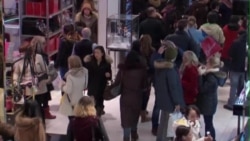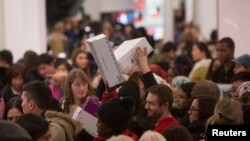The U.S. holiday shopping season is officially under way, with Black Friday discounts drawing millions of shoppers in stores and online.
From California to New York - this is how the holiday shopping season begins -- the early lines, the massive crowds - many of them lured in by Black Friday specials, from $99 flat screen TV’s to toys at less than half their usual price. It’s enough to bring in the savvy shoppers and those just curious to see what all the fuss is about.
“I’ve never been out on one of these Black Friday things before so just thought I’d check it out, see what's going on,” said one man. “I got this Highlanders [toy figures] on special for my kid, it’s a very good one.”
Earlier start
But Black Friday sales are no longer limited to the day after the Thanksgiving holiday. This year the shopping frenzy started early - with some stores opening as early as 6 a.m. Thanksgiving Day.
Traci Markel, who manages a shopping center in California, said traffic has been steady since Thursday night.
“We’ll expect hundreds of thousands [of people] until the end of tomorrow [Friday] night at 11 p.m.
Online retailers, such as Amazon, also launched Black Friday deals on Thursday.
It's when retailers hope to start moving into the black -- as in profits. This year, the sales and the deep discounts started early with retailers hoping to take advantage of improving consumer sentiment and pent-up demand.
Retail sales
The U.S. National Retail Federation forecasts holiday sales will increase 4.1 percent this year to nearly $617 billion. That is the biggest jump since 2011.
Early estimates show consumers spent more than $2 billion on Thanksgiving day. All told, American consumers are expected to spend more than $600 billion by the end of December -- largely the result of pent-up demand and more spending cash caused by low gasoline prices and an improving job picture.
Black Friday totals won’t be known until next week, but the National Retail Federation’s Kathy Grannis said the numbers are not as important as in previous years.
“Believe it or not, a good Black Friday is not indicative of an overall healthy holiday season. It could mean that there are more people focused on those deep discounts. Whereas if you were to see “normal” holiday shopping levels it means that people are spreading out their shopping. They’re not only focused on those 70, 75 percent off sales,” said Grannis.
Brits join in
And Black Friday shopping is no longer just an American phenomenon. It is becoming a tradition in Britain, too, which on Friday experienced the day's potential for chaos.
British police were called to stores across the country as the Black Friday frenzy led to rowdy crowds and customer disputes.
Amazon is credited with introducing Black Friday to British consumers in 2010.
Maintaining calm
Police in the United States also were at work trying to keep Black Friday shopping peaceful.
As in previous years, it may not be the safest day to shop -- as two shoppers fighting over a TV set at a Houston, Texas, Walmart found out.
And in Missouri, where protesters demanded stores shut down on Black Friday to protest a grand Jury’s decision not to indict a police officer who shot and killed an unarmed teen.
But for those who didn’t get a chance to shop during the Black Friday weekend -- there’s always Cyber Monday -- now one of the busiest online shopping days of the year.
Violent history
The name of the day itself actually alludes to a history of such darkness.
A linguistics researcher told VOA that many believe the "black" in Black Friday refers to store profits. The term "into the black" describes accounting ledgers going from negative values, known as "in the red" for the red ink used to document them, to positive values, traditionally written in black ink.
But Bonnie Taylor-Blake contends it appears the term "Black Friday" actually originated among police officers, who described it that way because of the large numbers of traffic incidents, sidewalk crowding and even violence it triggered.
In 2008, a Wal-Mart worker died after being trampled by a stampede of shoppers.
Material for this report came from The Associated Press and Reuters.






